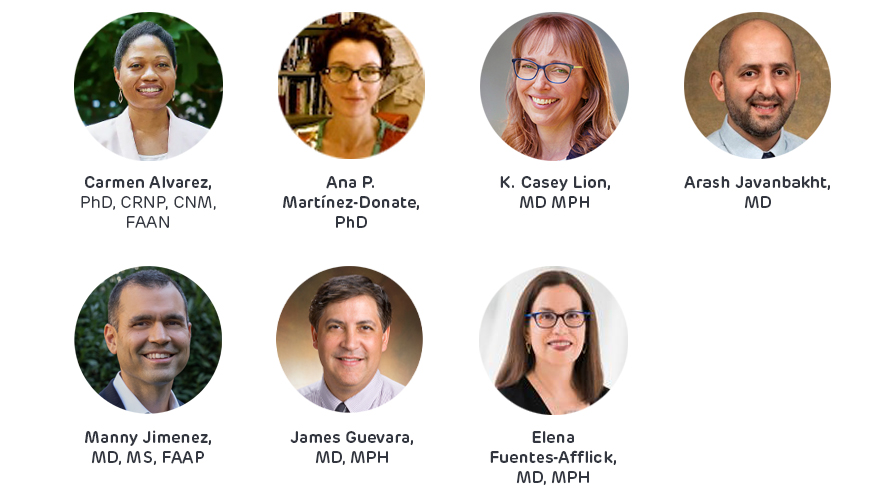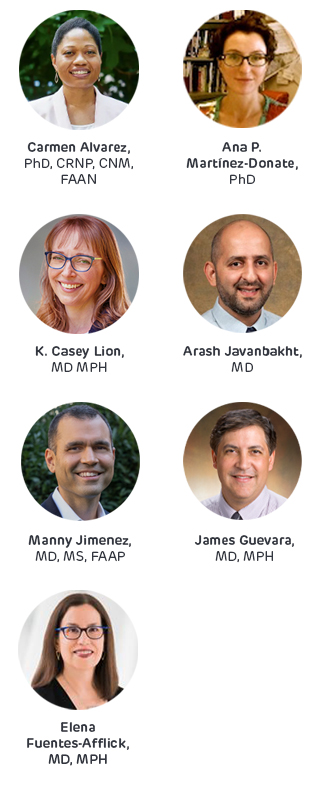Since 2022, the Multilingual Approaches to Research Studies (MARS) initiative has sought to equip health and public health researchers with the sensitivity, skills, and knowledge to better recruit and engage children, youth and families who prefer a language other than English in health research. The MARS initiative also seeks to support career development for multilingual investigators by providing training to leverage language skills for multilingual research and grant-seeking.
With these goals in mind, expert faculty from Children’s Hospital of Philadelphia (CHOP) and peer institutions host the in-person Short Course on MARS, featuring three days of lectures, case studies, workshops and consultations.
We also offer training online, including open-access webinars hosted by CHOP Online Pediatric Education Network (CHOP OPEN), and share relevant readings and resources with our network.
The MARS initiative is presented by Language Services, PolicyLab, and Clinical Futures at CHOP, and Penn State University Applied Linguistics. The MARS initiative is funded by NICHD (R25HD101359).
Join us for the 2026 MARS Short Course on June 1-3, 2026. Apply here.
For updates on MARS offerings, subscribe to our list-serv here.
Leaders

Advisors

The Short Course
Since 2022, we have hosted an annual Short Course on MARS in-person in Philadelphia. This hands-on, interactive training is designed for graduate students, postdoctoral fellows, faculty and research staff from a wide range of academic disciplines. Faculty have expertise in applied linguistics, translation and interpreting studies, community engagement, public health, nursing research, and medicine.
Course topics include:
- Best practices and advanced skills for working with interpreters for research
- Written translation protocols for all types of study documents
- Language-related requirements for all phases of a research project
- Design and management of a multilingual study
Hear more from course leadership about the benefits of MARS and what attendees can hope to learn in this video. Hear from course alumni on their takeaways from the course in these blog posts from 2023 and 2024.
Apply today for the 2026 Short Course—June 1-3, 2026.
Previous course agendas
Additional educational programming from MARS
Resources for Researchers
Glossaries: Effective Treatment of Refugee Adults with Post-Traumatic Stress Disorder (PolicyLab)
- The Language Specialist Perspective – What Health Researchers Should Know to Ensure Their Work with Interpreters and Translators Is Successful (CHOP OPEN)
- Translation of Multilingual Research Materials: Beyond the Basics (CHOP OPEN)
- Applying Plain Language in Multilingual Research (CHOP OPEN)
- Creating Bilingual Glossaries – A Tool for Researchers, Clinicians, and Public Health Professionals Working with Communities Who Speak Languages Other Than English (PolicyLab)
- New PolicyLab tool for providers: Translating Standardized Pediatric Questionnaires (PolicyLab)
- Identifying Best Practices for Conducting Anti-Racist Pediatric Research (PolicyLab)
- Toolkit for Written Translation (National Resource Center for Refugees, Immigrants, and Migrants)
- Estimating the Cost of Language Access Services (University of Wisconsin-Madison)
- Cross Cultural Survey Guidelines (University of Michigan)
- Dashboard for Plain Writing (StoryToolz)
- Everyday Words for Public Health Communication | The CDC Clear Communication Index (Centers for Disease Control and Prevention)
- Manual de Lenguaje Claro (Dirección General de Simplificación Regulatoria, México)
- Consent from Subjects with Limited English Proficiency (Short Form Consent) (Children’s Hospital of Philadelphia)
- Short Form Consent Forms (Children’s Hospital of Philadelphia)
- Multilingual Projects: Using Other Languages in RedCap (Children’s Hospital of Philadelphia)
- CIRTification: A human research protections training program tailored to the unique roles of community research partners (University of Illinois Chicago)
- Multilingual Research Justice Collaborative (Boston Children’s Hospital)
- Stakeholder Engagement Navigator (DICEmethods.org | University of Colorado Anschutz)
Resources for Undergraduate Students
- Anthropology in the Clinic: The Problem of Cultural Competency and How to Fix It (PLOS Medicine)
- Confronting "culture" in medicine's "culture of no culture" (Academic Medicine)
- Cultural Humility: People, Principles and Practices \ Vivian Chavez, Associate Professor of Health Education at SF State University
- Cultural Humility Versus Cultural Competence: A Critical Distinction in Defining Physician Training Outcomes in Multicultural Education (Journal of Health Care for the Poor and Underserved)
- The Refugee Project
- What’s your immigrant story? | University of Minnesota
- StoryCorps
- United Nations High Commissioner for Refugees
- Guidelines for Interpreted Visits | EthnoMed
- Chimamanda Ngozi Adichie: The danger of a single story | TED
Current Studies and Related Publications
Current studies
Publications from course faculty & leadership
Can You Hear Us? Emerging Guidance for Cross-language Qualitative Pediatric Research: A Systematic Narrative Review (Pediatrics)
Publications from course alumni
- Achieving Language Justice in Pediatric Hematology-Oncology: A Multinational Perspective for Language-Concordant Equitable Patient- and Family-Centered Care and Research Inclusion (Pediatric Blood and Cancer)
- Multilingual Research Strategies to Enhance Equity (JAMA Pediatrics)
Selected citations
- Characteristics of clinical trials that require participants to be fluent in English (Clinical Trials)
- Evaluating the frequency of English language requirements in clinical trial eligibility criteria: A systematic analysis using ClinicalTrials.gov (PLoS Medicine)
- Inclusion of Non-English speaking participants in pediatric health research: A review of 3 pediatric journals (JAMA Pediatrics)
- Engaging diverse community members to enhance analysis and interpretation: processing qualitative interview data (Family Medicine and Community Health)
- Strategies for overcoming language barriers in research (Journal of Advanced Nursing)

